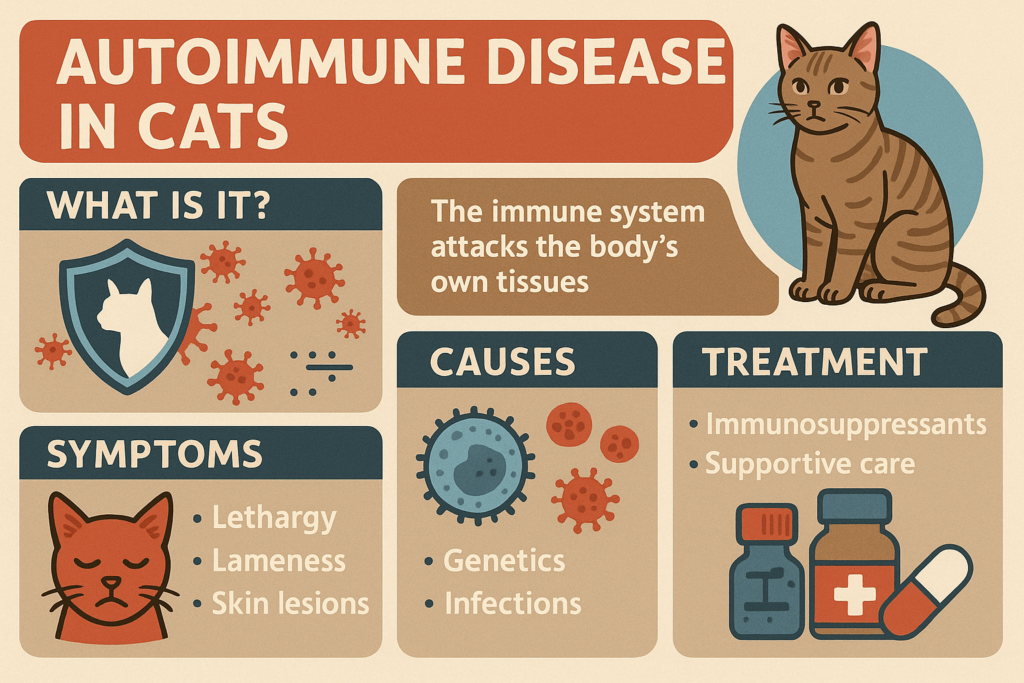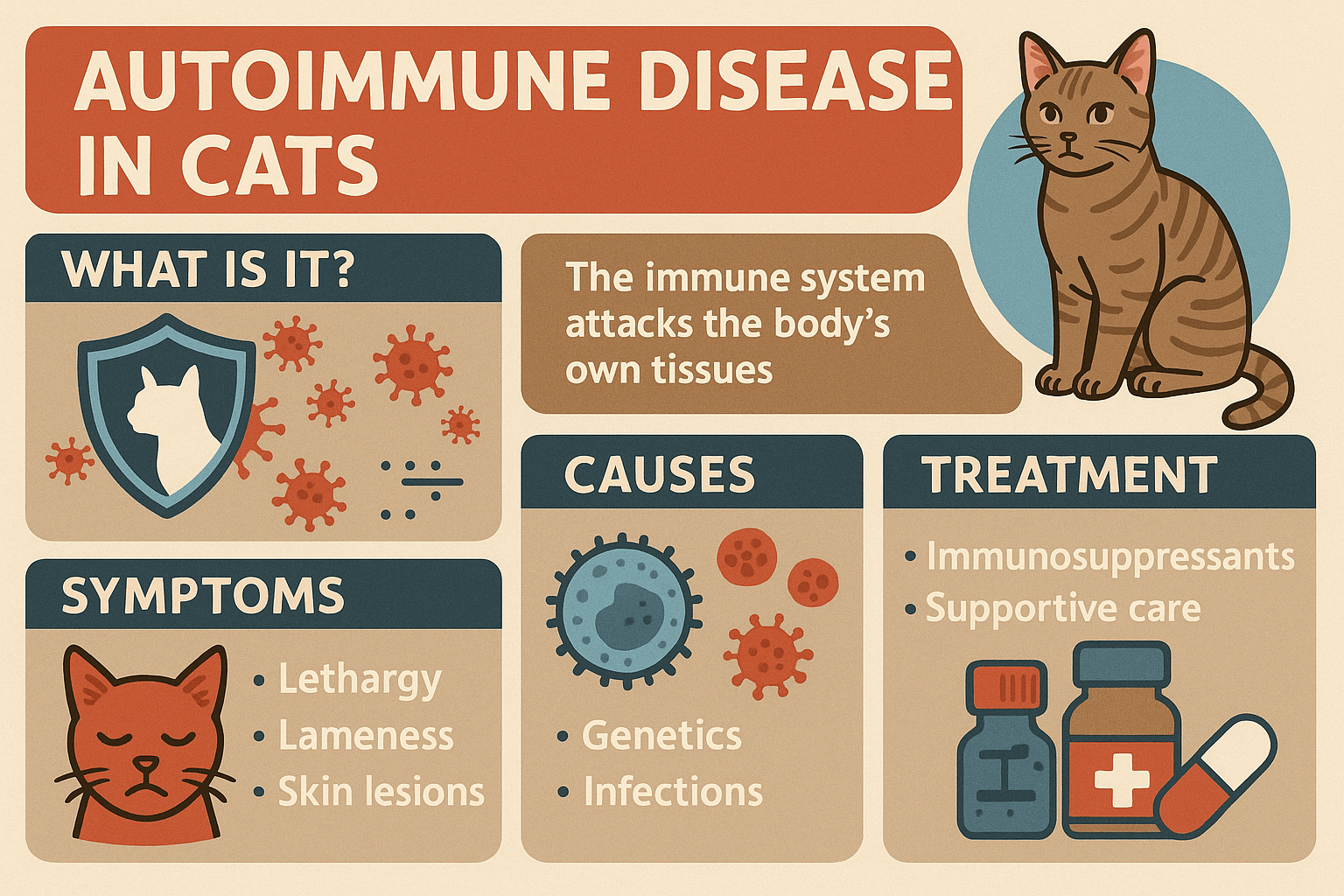Understanding Autoimmune Disease in Cats
Autoimmune diseases in cats occur when the immune system mistakenly attacks the body’s own cells, mistaking them for foreign invaders. These conditions can affect various organs and systems, leading to a wide range of symptoms that may be challenging to diagnose and manage. While autoimmune diseases are relatively rare in cats, they require prompt veterinary attention to prevent complications and improve your cat’s quality of life. In this blog post, we’ll explore the causes, symptoms, and treatment options for autoimmune diseases in cats, as well as how you can support your feline companion through their journey to recovery.
Common Types of Autoimmune Diseases in Cats
Autoimmune diseases can manifest in different ways, depending on which part of the body is affected. Understanding these conditions helps cat owners recognize potential issues early and seek appropriate care.
Immune-Mediated Hemolytic Anemia (IMHA):
This condition occurs when the immune system attacks red blood cells, leading to anemia and symptoms like lethargy, pale gums, and rapid breathing.Systemic Lupus Erythematosus (SLE):
SLE is a multi-system autoimmune disease that can cause skin lesions, joint pain, fever, and organ damage.Pemphigus Complex:
This group of skin disorders causes blisters, crusts, and sores on the skin due to the immune system attacking healthy skin cells.Inflammatory Bowel Disease (IBD):
While not always classified as autoimmune, IBD involves chronic inflammation of the gastrointestinal tract, often linked to immune dysfunction.Polyarthritis:
This condition results in inflammation of multiple joints, causing lameness, swelling, and discomfort for affected cats.
Recognizing these types of autoimmune diseases allows for earlier intervention and better management of symptoms, improving your cat’s prognosis.

Symptoms of Autoimmune Disease in Cats
Cats with autoimmune diseases may exhibit a variety of symptoms, many of which overlap with other health conditions. Being aware of these signs can help you identify potential problems and seek veterinary advice promptly.
Unexplained Weight Loss:
Sudden or gradual weight loss without changes in diet may indicate underlying immune system issues.Lethargy and Weakness:
Cats with autoimmune diseases often appear unusually tired or reluctant to engage in normal activities.Skin Abnormalities:
Symptoms like hair loss, scabs, ulcers, or rashes could signal an autoimmune-related skin disorder.Gastrointestinal Issues:
Persistent vomiting, diarrhea, or changes in appetite may point to immune-mediated digestive problems.Joint Pain or Swelling:
Difficulty moving, limping, or visible joint swelling may suggest polyarthritis or similar conditions.
Early detection of these symptoms is crucial for diagnosing autoimmune diseases and starting treatment before complications arise.
Check this guide 👉Understanding Cat Tick Disease: Best 7 Expert Tips!
Check this guide 👉Inflammatory Bowel Disease in Cats: Best 7 Tips!
Check this guide 👉Liver Disease in Cats: Best 7 Expert Tips!
Signs to Watch For | Potential Autoimmune Conditions |
|---|---|
Lethargy and fatigue | Immune-Mediated Hemolytic Anemia (IMHA) |
Skin lesions or sores | Pemphigus Complex |
Joint swelling or lameness | Polyarthritis |
Chronic vomiting or diarrhea | Inflammatory Bowel Disease (IBD) |
Fever or unexplained weight loss | Systemic Lupus Erythematosus (SLE) |
Diagnosing Autoimmune Disease in Cats
Diagnosing autoimmune diseases in cats can be complex, requiring thorough testing and evaluation by a veterinarian. Here’s what you can expect during the diagnostic process.
Comprehensive Physical Exam:
Your vet will perform a detailed examination to assess visible symptoms and gather information about your cat’s overall health.Blood Tests:
Blood work helps identify abnormalities such as anemia, elevated white blood cell counts, or organ dysfunction.Biopsy or Skin Scraping:
Samples from affected areas may be analyzed under a microscope to confirm diagnoses like pemphigus or lupus.Imaging Studies:
X-rays, ultrasounds, or other imaging techniques may be used to evaluate internal organs and rule out other causes of symptoms.Response to Treatment Trials:
In some cases, vets may initiate treatment for suspected autoimmune diseases and monitor the cat’s response to confirm the diagnosis.
Accurate diagnosis is essential for creating an effective treatment plan tailored to your cat’s needs.
Treatment Options for Autoimmune Disease in Cats
While autoimmune diseases cannot be cured, they can often be managed effectively with proper treatment and ongoing care. Here are some common approaches veterinarians use to treat these conditions.
Immunosuppressive Medications:
Drugs like corticosteroids are commonly prescribed to suppress the overactive immune response.Antibiotics or Antifungals:
Secondary infections caused by skin lesions or weakened immunity may require antibiotic or antifungal treatments.Dietary Adjustments:
A hypoallergenic or easily digestible diet may help reduce inflammation and support overall health.Pain Management:
Anti-inflammatory medications or pain relievers can alleviate discomfort associated with joint pain or swelling.Regular Monitoring:
Frequent check-ups and lab tests ensure the treatment remains effective and adjustments are made as needed.
With consistent care and monitoring, many cats with autoimmune diseases can live comfortably and maintain a good quality of life.
Common Misconceptions About Autoimmune Disease
There are several misconceptions surrounding autoimmune diseases in cats that can lead to confusion or misinformation. Clarifying these myths promotes better understanding and care.
Myth: Autoimmune Diseases Are Always Fatal:
While serious, many autoimmune conditions can be managed effectively with treatment, allowing cats to live comfortably.Myth: Only Older Cats Develop Autoimmune Diseases:
While age can be a factor, younger cats and kittens can also develop autoimmune conditions.Myth: Diet Alone Can Cure Autoimmune Diseases:
While nutrition plays a role, dietary changes alone cannot reverse autoimmune diseases; medical intervention is necessary.Myth: Vaccines Cause Autoimmune Diseases:
There is no definitive evidence linking vaccines directly to autoimmune diseases in cats.Myth: All Autoimmune Diseases Look the Same:
Symptoms vary widely depending on the specific condition and the organs involved.
By addressing these misconceptions, we can focus on accurate information and practical solutions for managing autoimmune diseases.
Preventive Measures for Supporting Immune Health
While autoimmune diseases cannot always be prevented, certain steps can support your cat’s immune system and overall well-being.
Provide a Balanced Diet:
High-quality food rich in essential nutrients supports immune function and reduces the risk of deficiencies.Minimize Stress:
Chronic stress weakens the immune system. Create a calm environment with plenty of hiding spots and enrichment activities.Regular Veterinary Check-Ups:
Routine exams allow early detection of potential issues before they escalate into serious problems.Limit Exposure to Toxins:
Avoid exposing your cat to harmful substances like cleaning chemicals, pesticides, or toxic plants.Maintain Proper Hygiene:
Regular grooming and parasite prevention keep your cat clean and reduce the risk of infections.
Taking these preventive measures strengthens your cat’s resilience and minimizes risks to their immune system.
Coping Strategies for Cat Owners
Caring for a cat with an autoimmune disease can be emotionally taxing, but adopting coping strategies helps you navigate this challenging journey.
Educate Yourself:
Learn as much as you can about your cat’s condition to feel empowered and confident in managing their care.Build a Support Network:
Connect with online communities or local groups of pet owners facing similar challenges for advice and encouragement.Practice Self-Care:
Taking care of yourself ensures you have the energy and emotional strength to care for your cat.Set Realistic Expectations:
Understand that progress may be slow and celebrate small victories along the way.Celebrate Your Bond:
Focus on the joy and companionship your cat brings to your life, even amidst health challenges.
By prioritizing both your cat’s needs and your own well-being, you can face autoimmune disease with resilience and hope.
Frequently Asked Questions About Autoimmune Disease in Cats
What causes autoimmune diseases in cats?
The exact cause is often unknown, but genetics, environmental factors, and infections may contribute to the development of these conditions.
Can autoimmune diseases be cured?
Unfortunately, autoimmune diseases cannot be cured, but they can often be managed with medication and lifestyle adjustments.
Are certain breeds more prone to autoimmune diseases?
Yes, some breeds, such as Siamese and Abyssinians, may have a higher risk of developing autoimmune conditions.
How long do cats live with autoimmune diseases?
With proper treatment and care, many cats can live for years after diagnosis, though outcomes vary depending on the severity of the condition.
Is autoimmune disease painful for cats?
Some conditions, like polyarthritis or pemphigus, can cause significant discomfort, but pain management strategies can help alleviate suffering.
Supporting Your Cat Through Autoimmune Disease
Autoimmune diseases in cats present unique challenges, but with early detection, proper treatment, and compassionate care, your feline friend can continue to lead a happy and fulfilling life. As a cat owner, staying vigilant about changes in behavior or health ensures timely intervention, while partnering with your veterinarian fosters the best possible outcome. Remember, your love and dedication play a vital role in helping your cat thrive despite their condition. Together, you can overcome the hurdles posed by autoimmune disease and cherish every moment with your beloved companion.
Newfoundland Dog Personality: Best 7 Expert Tips! – Discover the gentle, loyal, and protective nature of this giant breed perfect for families.
Can Hot Pavement Burn Your Cats Paws? Best 7 Expert Tips! – Learn how to protect your cat’s paws from hot surfaces and prevent painful burns this summer.
Can Hot Pavement Burn Your Dogs Paws? Best 7 Expert Tips! – Learn how to protect your dog’s paws from hot surfaces and ensure safe summer walks.
Irish Wolfhound Size: Best 7 Expert Tips! – Discover the ideal height, weight, and care tips for this majestic giant breed. Learn how to manage their impressive stature responsibly.





